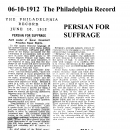Main menu
- ‘Abdu’l-Bahá’s Journey
- World Peace
- Stopping Racism in America
- Empowerment of Women
- More Principles...
- Prayer for America
Persian For Suffrage
Aged Leader of Bahá’í Movement Preaches Equal Rights.
In the quaint Oriental language of his mother-country ‘Abdu’l-Bahá Abbas, Persian nobleman, suffragist and chief priest of the Bahá’í movement for the unification of all mankind, told an audience of more than 2000 people in the Grace Baptist Temple last night that woman, if given the same education, is the superior of man, and that the happiness of the world will never be secured until the female of the species is privileged equally with the male.
“In the animal and vegetable kingdom,” said the Bahá’í priest, “male and female depend in equal proportions one upon the other; mankind alone denies its mate, womankind, proper and deserved privileges. Woman is weak only when man makes her weak. Because a child is a child, do we blame it for so being? No, we train it and educate it. We do not blame a patient for being a patient; we seek to cure and heal. So must we remedy the age-long differences between man and woman.”
Turning for a moment from his appeal for woman’s rights, the aged Persian referred as follows to the question between capital and labor:
“Readjustment of the economic condition,” he said, “is imperative. Until it comes there can be no true equality, and true equality is necessary because finally it must be assumed before the judgment seat. Six thousand years of unrest in the world has been due to prejudices — political, religious and otherwise. When they have passed away the great destroyers of the human foundation will have passed away, and warfare and animosity will be known no more.”
As chief priest of the Bahá’í movement, a distinction bequeathed to him by his father, Bahá’u’lláh, who, after writing the book of laws known as Kitah Akdas, died in a Turkish prison in 1892, ‘Abdu’l-Bahá Abbas stands for the unification of all races and sects through a universal enlightenment.
“The schools of the world,” he told his audience last night, “should be put upon a common basis. In them should be taught only two languages, the one the national tongue, and the other the international or auxiliary language, which should be agreed upon by a congress of the world’s teachers. Efficiency in the auxiliary tongue should be made compulsory.”
Religion’s attitude towards science he explained to be the same as the attitude of knowledge towards teaching.
“Religion,” he said, “is the cause of everything; it represents the unification of men because it represents love and the mercy of God. It must be in accord with science; if it conflicts then it is wrong, for science is the opposite of ignorance and ignorance is the enemy of religion.”
‘Abdu’l-Bahá Abbas arrived in Philadelphia Saturday night and while here he is under the direction of the Philadelphia branch of the Bahá’í movement, of which Miss Jessie Revell, of No. 1429 Mayfield avenue, is the leader. The old Persian appears always in his native garb, a black or white fez, with long robe of dark cloth. He is 65 years old, and the third of the Bahá’í chief priests, Ali Mohammed, known to Persians as Báb, or the door of intelligence, having preceded ‘Abdul’s father. ‘Abdu’l-Bahá Abbas interpreted the works of his father, together with the Bahá’í Bible, and for so doing was imprisoned for 42 years or until the Young Turk movement brought his liberation. The addition of ‘Abdu’l-Bahá to Abbas, his family name, suggests the title of “servant of God.” With him in this city are Dr. Ameen Farred and Mirza Amed Sohrab, who interpret his speeches for the understanding of the audiences in the several countries the Persian visits.









